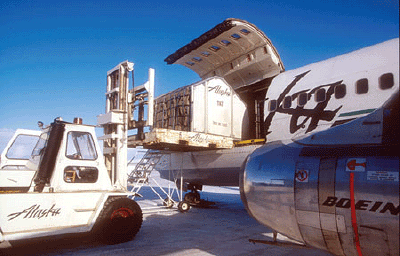Wed, Jan 12, 2005
NPRM Endorses Creation Of "All-Cargo" Security Program
 NATA says it supports a
Transportation Security Administration (TSA) proposal to address
cargo security using a risk-based approach.
NATA says it supports a
Transportation Security Administration (TSA) proposal to address
cargo security using a risk-based approach.
The TSA Notice of Proposed Rulemaking (NPRM), believed to be the
agency's first, announced formation of a new "All-Cargo" security
program for larger cargo aircraft and several other new security
initiatives for the cargo industry. "We are particularly pleased
that the TSA issued this as an NPRM, so that industry input is
received prior to implementation of new regulations. The TSA's
trend of direct to final rules appears to have finally subsided,"
explained NATA Vice President Eric R. Byer.
The association agreed with the TSA's assessment that a risk
management philosophy is the best approach to securing cargo
carried on aircraft.
"This approach recognizes that 100% screening of all cargo is
not only impractical but would cause incalculable damage to the
nation's economy," Byer said. "The layered approach to security
will allow both government and industry to direct resources to
those areas with the greatest risk that can then derive the
greatest security benefit."
For the smaller cargo carriers represented by NATA, the TSA
intends to continue compliance with the Twelve-Five Standard
Security Program (TFSSP). The NPRM proposes that any all-cargo
aircraft weighing more than 45,500 kg will comply with the new
All-Cargo program. Most all-cargo aircraft currently subject to the
TFSSP are small businesses operating as Part 135 on-demand air
carriers.
"We believe, and the TSA concurs, that the TFSSP imposes the proper
security level by recognizing that these carriers' smaller size and
operational environment create a different security risk profile
than that of the large aircraft cargo haulers," Byer said.

Of concern to NATA was a proposed expansion of security areas,
known as SIDAs, to include cargo areas at certain airports already
subject to security regulations. NATA believes the costs for this
proposal and the potential safety impacts for nearby general
aviation areas have not been adequately considered by the TSA.
NATA's comments also suggested some changes to the proposed
rules to clarify the regulatory intent and prevent confusion within
the industry.
More News
Also: Vertical Flight Society, NBAA Maintenance Conference, GA Honored, AMT Scholarship For the first time, students from Embry-Riddle’s Daytona Beach, Florida, campus took t>[...]
Hazardous Weather Information Summary of significant meteorological information (SIGMET/WS), convective significant meteorological information (convective SIGMET/WST), urgent pilot>[...]
"The need for innovation at speed and scale is greater than ever. The X-62A VISTA is a crucial platform in our efforts to develop, test and integrate AI, as well as to establish AI>[...]
(FAA) Inspector Observed That Both Fuel Tanks Were Intact And That Only A Minimal Amount Of Fuel Remained In Each Analysis: According to the pilot, approximately 8 miles from the d>[...]
“Pyka’s Pelican Cargo is unlike any other UAS solution on the market for contested logistics. We assessed a number of leading capabilities and concluded that the Pelica>[...]
 Airborne-Flight Training 05.09.24: ERAU at AIAA, LIFT Diamond Buy, Epic A&P
Airborne-Flight Training 05.09.24: ERAU at AIAA, LIFT Diamond Buy, Epic A&P ANN's Daily Aero-Term (05.07.24): Hazardous Weather Information
ANN's Daily Aero-Term (05.07.24): Hazardous Weather Information Aero-News: Quote of the Day (05.07.24)
Aero-News: Quote of the Day (05.07.24) NTSB Final Report: Cessna 150
NTSB Final Report: Cessna 150 Aero-News: Quote of the Day (05.08.24)
Aero-News: Quote of the Day (05.08.24)




